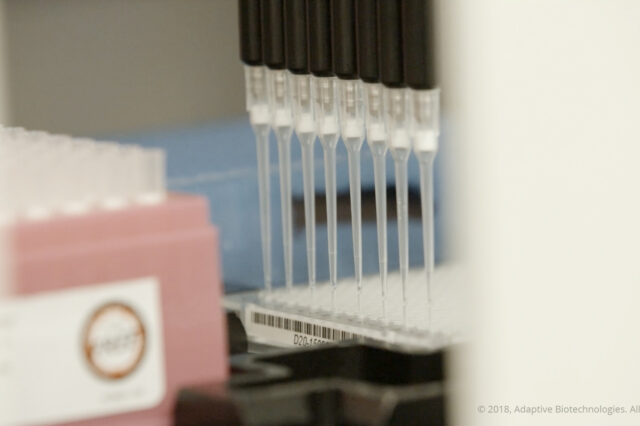UF Health, King’s College London researchers awarded $3.7 million to study molecular origins of type 1 diabetes

For people with Type 1 diabetes, it is an ongoing battle: Their immune system goes rogue, killing cells in the pancreas that regulate blood sugar. Now, a University of Florida and King’s College London collaboration has been awarded $3.7 million in support to discover the molecular signposts that lead to Type 1 diabetes. The team is also collaborating with researchers at the University of Oslo in Norway.
The collaboration will focus on groups of proteins known as T-cell receptors, which play a role in the autoimmune process that destroys insulin-producing beta cells in the pancreas. Learning more about the molecular signatures of T-cell receptors through a genetic sequencing process is a crucial step in battling the disease, said Todd M. Brusko, Ph.D., a UF Health diabetes researcher and co-principal investigator for the grant.
Brusko and co-investigator Mark Peakman, Ph.D., an immunology professor at King’s College London, will work to identify early biomarkers of the T-cell receptors’ molecular signatures.
“I am very excited at the opportunity to bring a leading technology to this important research question, in a way that could transform the way we view Type 1 diabetes in the future,” Peakman said.
Adaptive Biotechnologies, a Seattle-based company specializing in DNA sequencing of the adaptive immune system, is providing $1.8 million of in-kind support in exchange for joint ownership of the data. The Leona M. and Harry B. Helmsley Charitable Trust is contributing a $1.9 million grant, with $1.3 million going to research at UF Health and $600,000 to King’s College London.
Genetic sequencing of T-cell receptors should ultimately allow scientists to find the rogue T-cells that cause Type 1 diabetes with “incredible sensitivity,” Brusko said. That, in turn, could someday produce accurate predictions of who will develop Type 1 diabetes and track its progression even before symptoms emerge. Sequencing also raises the potential for knowing whether future Type 1 diabetes treatments targeting the immune system are effective.
“The idea is to track the development of these receptors over time because some of them go on to cause disease,” Peakman said.
Victor Greiff, Ph.D., an associate professor of immunology at the University of Oslo, will also contribute to data analysis using computer algorithms and machine learning approaches.
The ultrasensitive technology being used for the research has already been applied to cancer cases, where it can detect one cancer cell among 1 million healthy cells and reveal whether cancer treatments are working. That same technology will help researchers locate the biomarkers that precede Type 1 diabetes.
“Think of each T-cell receptor having a unique barcode,” Brusko said. “We ultimately hope to scan those barcodes to find the earliest signatures of disease before insulin-producing beta cells have been destroyed.”
Adaptive Biotechnologies will provide use of its technology to sequence DNA and help identify the molecular signatures of Type 1 diabetes.
“Adaptive Biotechnologies is thrilled to collaborate with UF Health and King’s College London in partnership with the Helmsley Charitable Trust to change the way we diagnose and treat Type 1 diabetes,” said Harlan Robins, Ph.D., co-founder and head of innovation, Adaptive Biotechnologies. “We will provide use of the immunoSEQ® platform to sequence DNA from the blood samples and help identify the molecular signatures of Type 1 diabetes. The data generated from the collaboration will also be used to fuel our work on the Adaptive Antigen Map, to decipher how the human immune system recognizes and combats disease.”
“The collaboration is a great example of how academic research centers, the biotechnology industry, and nonprofit foundations can work together with the common goal of trying to discover better diagnostics for people with Type 1 diabetes. Helmsley is focused on leveraging the power of this type of innovative partnership,” said Maryaline Coffre, Ph.D., Helmsley Type 1 diabetes associate program officer.
Identifying the autoreactive cells that can initiate Type 1 diabetes is an important step toward preventing or managing the disease, Brusko said.
“If we can identify at-risk individuals before they develop clinical disease, we can try to prevent their immune system from killing off beta cells and have them avoid a lot of complications,” he said.
About the researchers: Todd M. Brusko, Ph.D., is an associate professor in the UF College of Medicine’s department of pathology, immunology and laboratory medicine and a UF Diabetes Institute faculty member.
Mark Peakman, Ph.D., is a professor of clinical immunology at King’s College London and an honorary consultant immunologist at King’s College Hospital.
About the Helmsley Charitable Trust: The Leona M. and Harry B. Helmsley Charitable Trust aspires to improve lives by supporting effective organizations in health and select place-based initiatives. Since 2008, Helmsley has committed more than $2 billion for a wide range of charitable purposes. For more information, visit www.helmsleytrust.org.
About King’s College London: King's College London is one of the top 10 U.K. universities in the world (QS World University Rankings, 2018-19) and among the oldest in England. It has more than 31,000 students and a reputation for world-class teaching and research.
About Adaptive Biotechnologies: Adaptive Biotechnologies is a pioneer and leader in combining next-generation sequencing and expert bioinformatics to profile T-cell and B-cell receptors. Adaptive is bringing the accuracy and sensitivity of its immunosequencing platform to researchers and clinicians around the world to drive groundbreaking research in cancer and other immune-mediated diseases. Adaptive also translates immunosequencing discoveries into clinical diagnostics and therapeutic development to improve patient care. For more information, visit adaptivebiotech.com.
About the author
